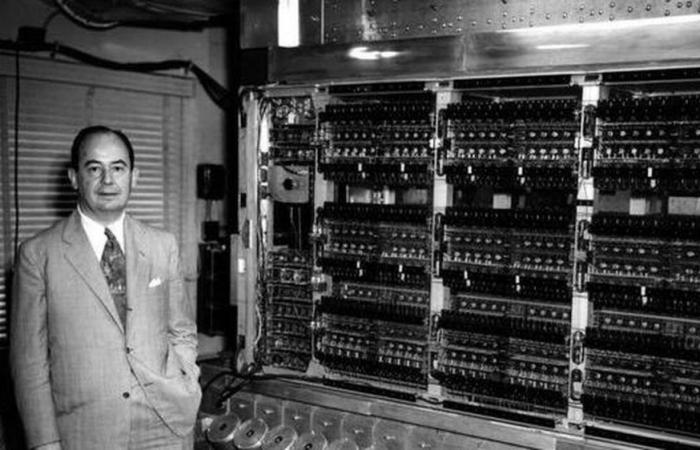What are you waiting for, directors and producers, to make a great film about John von Neumann? Other than the film about Oppenheimer or any other scientist! You have in your hands, screenwriters and producers, literally explosive material. Forgive the reader for this beginning, but it comes from coming across a very beautiful book that we should all absolutely read, and which sheds light on the diabolical tangles we experience in the contemporary world: the book was written by the scientific journalist Ananyo Bhattacharyais called The Man from the Future. The visionary life of John Neumann, and Adelphi publishes it. The book tells the life of what for many was the greatest mathematical genius of the last century, the son of a Jewish-Hungarian banker and then, after the rise of Nazism, he emigrated to the USA, ceasing to be Neumann Jànos Lajos to become John.
It was said of him that he was “addicted, in particular to mathematical thought” and that he was more acute than two supreme geniuses such as Einstein and Godel: but the most interesting thing about Neumann was that, despite being a great “natural” mathematician, he put mathematics at the service of quantum physics, political economy, game theory, explosives engineering, the atomic bomb and that “thing” that today we call artificial intelligence. Neuman was a mathematical mind capable of abstracting like no one else: but at the same time he was one of the most influential men for the development of American war policy; his theories or models for the economy influenced an entire branch of economics, always political, which continues to this day; and it was the Manhattan Project scientist who was responsible for calculating how to cause more damage to the enemy with the explosion of the bomb on Nagasaki. With game theory, a book he wrote with Morgenstern, starting from logical-behavioral games such as the “prisoner’s dilemma” or the “minimax” (two brothers are told that they have to divide a cake; one is given the right to cut it and the other to choose the slice; if the one who cuts acts in a not “do-gooder” but rational way, he will try to make 2 equal slices, so that the brother who chooses will not be able to take the larger slice: but… but then if human behavior is always deviated, Neumann thinks, by calculation, selfishness, irrationality etc. how will the “clash”, which is what it is, the “war”, which is what it is, for the division of the cake end?) and other logical games: a very complex theory that enormously influenced the eggheads of the Pentagon, and which perhaps still today influences tactical declarations such as that of Stoltenberg, which many take as a joke but which are instead suggested by the think-tank that works for the the American army, but which today every large army has at its disposal.
But perhaps most of all Neumann is, with Wiener and Turing but with a more future outlook, the true father of the idea of contemporary AI, and in particular of the “dream” of the self-replication of artificial brains or, as they once said, of thinking machines. Wouldn’t all this be enough for a great story? Well, then we will remember the fact that an expert in Byzantine history refused to go to a party at Neumann’s, explaining to Neumann’s wife that he wanted to maintain his reputation as an expert and that by going there he was exposing himself to defeat: Neumann was also an expert in Byzantine history! And then a connoisseur and speaker in Greek and Latin, French, English, German: but also in love with luxury cars and houses and, as he himself said when advising his daughter against marrying a university professor, in love with money. And it was his idea, around 1948, to unleash a “preventive” nuclear war against the Soviet Union before it could arm itself, to crush it definitively: something already used satirically by Kubrick in Doctor Strangelove. Finally Neumann ended up in a wheelchair, due to the exposure to radiation he had suffered while going to observe an atomic explosion: and in 1957, on his deathbed, brain-destroyed, he begged his daughter to ask him, he who as a child he calculated sequences of numbers by heart, as much as 3×4. Who was John von Neumann? Was he really, as colleagues sometimes said, an extraterrestrial who had learned to perfectly simulate the behavior of a human being? Was he the being that McCarthy made appear in his last two great novels? One thing is certain: anyone who wants to understand the tangle we are in today, from AI problems to almost world wars, will have to read The Man from the Future.






